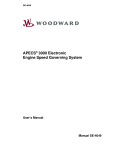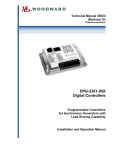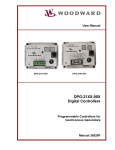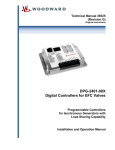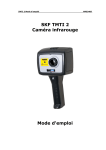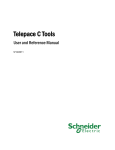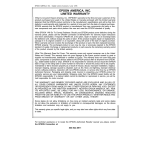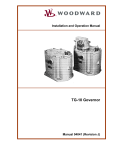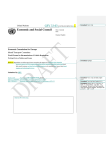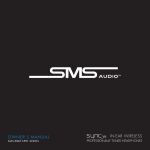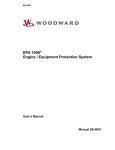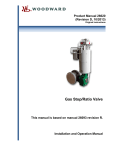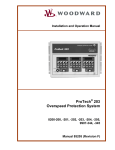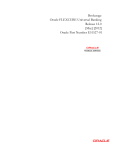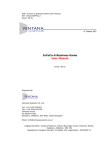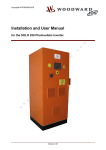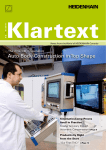Download DPG-210X Digital Controllers
Transcript
Technical Manual 36543 (Revision B) Original Instructions DPG-210X Digital Controllers Programmable Controllers for Isochronous Generators Installation and Operation Manual • DEFINITIONS • • • • This is the safety alert symbol. It is used to alert you to potential personal injury hazards. Obey all safety messages that follow this symbol to avoid possible injury or death. DANGER—Indicates a hazardous situation which, if not avoided, will result in death or serious injury. WARNING—Indicates a hazardous situation which, if not avoided, could result in death or serious injury. CAUTION—Indicates a hazardous situation which, if not avoided, could result in minor or moderate injury. NOTICE—Indicates a hazard that could result in property damage only (including damage to the control). IMPORTANT—Designates an operating tip or maintenance suggestion. The engine, turbine, or other type of prime mover should be equipped with an overspeed shutdown device to protect against runaway or damage to the prime mover with possible personal injury, loss of life, or property damage. The overspeed shutdown device must be totally independent of the prime mover control system. An overtemperature or overpressure shutdown device may also be needed for safety, as appropriate. Read this entire manual and all other publications pertaining to the work to be performed before installing, operating, or servicing this equipment. Practice all plant and safety instructions and precautions. Failure to follow instructions can cause personal injury and/or property damage. This publication may have been revised or updated since this copy was produced. To verify that you have the latest revision, be sure to check the Woodward website: www.woodward.com/pubs/current.pdf The revision level is shown at the bottom of the front cover after the publication number. The latest version of most publications is available at: www.woodward.com/publications If your publication is not there, please contact your customer service representative to get the latest copy. Any unauthorized modifications to or use of this equipment outside its specified mechanical, electrical, or other operating limits may cause personal injury and/or property damage, including damage to the equipment. Any such unauthorized modifications: (i) constitute "misuse" and/or "negligence" within the meaning of the product warranty thereby excluding warranty coverage for any resulting damage, and (ii) invalidate product certifications or listings. To prevent damage to a control system that uses an alternator or battery-charging device, make sure the charging device is turned off before disconnecting the battery from the system. To prevent damage to electronic components caused by improper handling, read and observe the precautions in Woodward manual 82715, Guide for Handling and Protection of Electronic Controls, Printed Circuit Boards, and Modules. Revisions—Text changes are indicated by a black line alongside the text. Woodward Governor Company reserves the right to update any portion of this publication at any time. Information provided by Woodward Governor Company is believed to be correct and reliable. However, no responsibility is assumed by Woodward Governor Company unless otherwise expressly undertaken. © Woodward 2010 All Rights Reserved Manual 36543B DPG-210X Digital Controllers Contents REGULATORY COMPLIANCE ........................................................................ II Declaration of Conformity ....................................................................................... ii ELECTROSTATIC DISCHARGE AWARENESS ................................................. IV CHAPTER 1. GENERAL INFORMATION ........................................................... 1 Introduction .............................................................................................................1 CHAPTER 2 CONTROLLER SPECIFICATIONS ................................................. 2 User Interface Operation ........................................................................................3 Keypad ............................................................................................................3 Gain Potentiometer .........................................................................................3 LED .................................................................................................................3 CHAPTER 3 PARAMETER REFERENCE .......................................................... 4 Set Speed and Gain Settings .................................................................................4 Adjusting Engine Set Speed and Gain Setting Together ......................................5 Integral Limit Setting ...............................................................................................6 Adjusting the Integral Limit .............................................................................6 CHAPTER 4. INSTALLATION INSTRUCTIONS .................................................. 8 Recommended Mounting .......................................................................................8 Terminal Descriptions .............................................................................................8 Wiring Diagram .......................................................................................................9 Centralized Suppression ......................................................................................10 CHAPTER 5. DIAGNOSTICS & TROUBLESHOOTING ...................................... 12 Troubleshooting Chart ..........................................................................................12 CHAPTER 6. SERVICE OPTIONS ................................................................. 14 Product Service Options .......................................................................................14 Woodward Factory Servicing Options ..................................................................15 Returning Equipment for Repair ...........................................................................15 Packing a Control .........................................................................................16 Replacement Parts ...............................................................................................16 Engineering Services............................................................................................16 How to Contact Woodward ...................................................................................17 Technical Assistance ............................................................................................17 Illustrations Figure 1. Wiring Diagram for DPG-210X Controllers .............................................9 Figure 2. Centralized Suppression Implemented at System Level ......................11 Woodward i DPG-210X Digital Controllers Manual 36543B Regulatory Compliance Declaration of Conformity ii Woodward Manual 36543B DPG-210X Digital Controllers EMC Limitations Cabling All cabling for this unit is limited to less than 30m (98.4’). See wiring diagrams for specific cable types required. Power cabling is limited to less than 10m (32.8’) in total length from its source; power is intended to be from a local bus structure. The control is NOT intended to have a power bus that is derived from a plant-wide distribution system, remote source, or similar “mains” type distribution systems. The power to the control should also be a dedicated circuit, directly to the battery or source via a power and return wire that are routed together. See User Manual 36526 for additional regulatory information, limitations, and wiring diagrams with specific, required cable types. Power Bus The power bus is intended to be a local bus without power line surges and to have inductive load kickback events suppressed. Therefore, the control’s power input is not designed to withstand a charging system load dump, heavy inductive kickbacks, or heavy surge type pulses. If the control is installed outside its intended usage, as described in this manual, centralized voltage pulse suppression should be implemented to help protect the control and other components on the bus. (See Chapter 6: Installation Instructions.) COMM Port The COMM port is intended to be a service port, with only temporary connection during service or initial configuration. The COMM port is susceptible to some EMC phenomena and possible unintentional battery return currents. 1. Battery return (B-) is also the communication signal common; typically PCs connect the communication signal’s common to protective earth. The PC grounding can provide an unintended return path for B- currents. If B- and the PC are grounded to protective earth, a communication isolator should be used between the PC and the control. Damage to the PC or control, and/or unintended operation may result from a broken battery return wire or the parallel path. 2. The pins inside the COMM port plug are susceptible to damage by ESD discharges, static electricity arcs. Care should be taken not to touch them with tools or put fingers into the port. Always touch your hand or tool to a grounded piece of metal (discharge ESD) prior to coming in contact with the communication port. 3. The input is susceptible to RF noise such as switching transients and transmitter signals coupled into the communication cable. Cable orientation and short cable length may be used to eliminate these issues, depending on the severity of the environment. Woodward iii DPG-210X Digital Controllers Manual 36543B Electrostatic Discharge Awareness All electronic equipment is static-sensitive, some components more than others. To protect these components from static damage, you must take special precautions to minimize or eliminate electrostatic discharges. Follow these precautions when working with or near the control. 1. Before doing maintenance on the electronic control, discharge the static electricity on your body to ground by touching and holding a grounded metal object (pipes, cabinets, equipment, etc.). 2. Avoid the build-up of static electricity on your body by not wearing clothing made of synthetic materials. Wear cotton or cotton-blend materials as much as possible because these do not store static electric charges as much as synthetics. 3. Keep plastic, vinyl, and Styrofoam materials (such as plastic or Styrofoam cups, cup holders, cigarette packages, cellophane wrappers, vinyl books or folders, plastic bottles, and plastic ash trays) away from the control, the modules, and the work area as much as possible. 4. Do not remove the printed circuit board (PCB) from the control cabinet unless absolutely necessary. If you must remove the PCB from the control cabinet, follow these precautions: • Do not touch any part of the PCB except the edges. • Do not touch the electrical conductors, the connectors, or the components with conductive devices or with your hands. • When replacing a PCB, keep the new PCB in the plastic antistatic protective bag it comes in until you are ready to install it. Immediately after removing the old PCB from the control cabinet, place it in the antistatic protective bag. To prevent damage to electronic components caused by improper handling, read and observe the precautions in Woodward manual 82715, Guide for Handling and Protection of Electronic Controls, Printed Circuit Boards, and Modules. iv Woodward Manual 36543B DPG-210X Digital Controllers Chapter 1. General Information Introduction DPG-210X controllers can be used on both diesel and gas engines. They can operate over a frequency range of 1000 to 11,000 Hz, and over a nominal voltage range of 9 to 30 Vdc. Engine governing is adjustable over a wide range of engine set speeds. An engine’s set speed, also known as its target speed, can be any frequency from 1,000 Hertz to 11,000 Hertz. The following formula shows the relationship between engine rpm and Hertz. (MPU signal in Hertz) = (Engine rpm) x (# of Flywheel Teeth) 60 sec A magnetic pickup or MPU provides the engine speed signal to the controller in Hertz. The controller compares this signal to the user’s programmed set speed, also in Hertz, to determine whether fuel to the engine needs to increase or decrease in order for the engine speed to equal the target speed. The fuel flow is controlled with an actuator. The actuator may be part of a throttle body or connected to a separate throttle body with mechanical linkage. The controller provides a drive signal to the actuator to cause more or less fuel to flow through the throttle body thus affecting the engine’s speed. Features include: • Isochronous speed control • User friendly / operator adjustable • Precision frequency control: 0.25% • Superior temperature stability • Reverse battery protection • Input voltage range: 9–30 Vdc Actuator Compatibility: DYNA 2000 DYNA 2500 DYNA 70000 DYNA 70025 DYNA 10141 DYNA 8000 DYNA 8200 DYNA 8400 APECS 0150 APECS 0250 APECS 0300 EPG 512 EPG 1724 Part Numbers Available: DPG-2102 DPG-2103 DPG-2104 DPG-2105 DPG-2107 (Please see Chapter 3 for user adjustable factory settings.) Woodward 1 DPG-210X Digital Controllers Manual 36543B Chapter 2 Controller Specifications The controller’s main electrical and mechanical specifications are listed here along with several performance characteristics. Electrical Operating Voltage Range: Rated Output Current: Maximum Surge Current: Temperature Stability: Connections: Input Signal Startup: Normal Operation: Input Signal from Magnetic Pickup: Input Signal from Engine’s Ignition System: 9–30 Vdc * 7 A Maximum (continuous) 14 A (not to exceed ten seconds) 0.007 Hz @ 158°F (70°C) Euro style terminal strip 0-1000 Hz 1000-11,0000 Hz 2.5 VAC RMS minimum during cranking 40 V minimum during cranking (*) All cabling for these controllers is limited to less than 3m (9.84’). Power cabling is limited to less than 10m (32.8’) in total length. See wiring diagrams for specific cable types required. Mechanical Ambient Operating Temperature: Vibration: -40°F to +180°F (-40°C to +82°C) Suitable for mounting per SAE J1455; 1 to 500 Hz, 5G amplitude Controller Adjustment: Set speed using increase/decrease pushbuttons and Gain adjustment (270°) Sealing: Oil, water, and dust resistant via conformal coating and die cast enclosure Weight: 0.6 lbs (28 kg) Performance Steady State Speed Band: Temperature Stability: 2 ± .25% over ambient operating temperature range 0.007 Hz @ 158°F (70°C) Woodward Manual 36543B DPG-210X Digital Controllers User Interface Operation Keypad DPG-210X controllers provide two buttons for adjusting the engine set speed. • INC – increases the Set Speed • DEC – decreases the Set Speed Gain Potentiometer The DPG-210X controller provides a potentiometer (labeled GAIN) for two separate adjustments: • Overall gain setting • Integral limit setting LED The LED (Light Emitting Diode) is used as a status and operating indicator. When the LED is off, it indicates that one of the following is true: • The unit is not being powered. • The unit is reverse powered (check polarity of supplied power). If a voltage between 9 Vdc and 30 Vdc is being properly supplied across the BAT+ and BAT- connector pins of the controller and the LED is off, then refer to the troubleshooting chapter. A slow blinking LED indicates all of the following: 1. The unit is powered. 2. The unit is in the GAIN ADJUST MODE (the gain setting can be adjusted). 3. There is no MPU (Magnetic Pick-Up) signal. This means the engine is not running. If the engine is running and the LED is blinking slow then refer to the troubleshooting chapter for help in diagnosing why the MPU signal to the controller is missing. A fast blinking LED indicates all of the following: 1. The unit is powered. 2. The unit is in the GAIN ADJUST MODE (the gain setting can be adjusted). 3. There is an engine speed signal at the controller’s MPU terminals. When the LED is on and not blinking it indicates the following; 1. The unit is powered. 2. The unit is in INTEGRAL LIMIT ADJUST MODE. The integral limit setting can be adjusted. In this operating mode it is not evident from the LED whether the engine is running or not. The engine should not be running when adjustments to the integral limit are being made. NOTE: The slow blink rate = 1/2 Hertz (the LED is turned on for 1 second followed by off for 1 second then on again and so on). The fast blink rate is 3 times faster than the slow blink rate. . Woodward 3 DPG-210X Digital Controllers Manual 36543B Chapter 3 Parameter Reference DPG-210X controllers have three user-adjustable parameters: Set Speed, Gain, and Integral Limit. The table below shows the factory, minimum, and maximum settings for these parameters PARAMETER FACTORY SETTING MINIMUM SETTING MAXIMUM SETTING Set Speed 1,000 Hertz 1,000 Hertz 11,000 Hertz Gain 20% 1% 100% 20% 100% DPG-2102 75% DPG-2103 Integral Limit DPG-2104 DPG-2105 76% DPG-2107 50% The table below shows the factory settings for PID. PID FACTORY SETTINGS DPG MODEL Kp Ki Kd Proportional Gain Integral Gain Derivative Gain DPG-2102 0.66 1.46 0.022 DPG-2103 0.38 0.8 0.02 DPG-2104 0.9 2.0 0.036 DPG-2105 1.0 1.4 0.15 DPG-2107 0.45 0.4 0.04 Set Speed and Gain Settings The SET SPEED and GAIN adjustments work together. These adjustments are made while the engine is running. NOTE: The factory setting for the SET SPEED is 1000 Hertz. The factory setting for the GAIN potentiometer is 20%. The INC and DEC buttons are active whenever the controller is powered. The set speed is increased using the INC button. A momentary INC button press and release will increase the set speed by 1 Hertz. Press and hold the INC button to increase the set speed rapidly. The set speed is decreased using the DEC button. 4 Woodward Manual 36543B DPG-210X Digital Controllers The gain adjustment is used to modify how fast the controller responds to engine speed changes due to changing loads on the engine. Higher gain settings are more sensitive to changes in engine speed than are lower gain settings. Gain settings too high or too low can hinder the controller’s ability to maintain a steady engine speed at the set speed. As a general rule low set speeds require low gain settings. Likewise, higher set speeds require higher gain settings. For example: A set speed of 5040 Hertz will typically require a gain setting between 40% and 60% while a set speed of 3000 Hertz often works best with a gain setting between 20% and 40%. GAIN ADJUST MODE is active when the LED is blinking either fast or slow. If the controller is powered and the LED is on and not blinking the controller is currently in INTEGRAL LIMIT ADJUST mode. To put the controller back in GAIN ADJUST MODE do one of the following: • Turn the power to the controller off then back on, or • Press and hold, for approximately 5 seconds, both the INC and DEC buttons until the LED starts blinking then release the buttons. Adjusting Engine Set Speed and Gain Setting Together The DPG-210X is a very versatile controller. The speed range is 1000 Hz to 11,000 Hz. The wide range of speed adjustment also has wide range of gain adjustments. The speed adjustment and gain adjustment ranges are in direct relationship with each other. Therefore, when adjusting the controller speed it will be necessary to adjust gain also. Controllers are factory adjusted to 1000 Hz. An independent overspeed shut down device is required to prevent loss of engine control which may cause personal injury and/or equipment damage. Please read this entire procedure first before making any adjustments. 1. With no power to the governor, verify that gain is set to 20% or factory default. 2. Start the engine and adjust the speed by pressing increase/decrease speed buttons until targeted speed is achieved or engine begins to hunt. Use a customer-supplied tachometer or frequency meter to verify speed. 3. If the engine begins to hunt adjust the gain to remove the hunt. The isochronous governor holds a fixed speed. If the engine varies speed slowly (oscillation rate < 1Hz) then increase the gain (in small increments) until oscillation disappears. For a fast hunt, which is defined as a 1Hz or greater oscillation, decrease the gain in small increments. This adjustment may need to be made as engine speed is adjusted to the target speed. Woodward 5 DPG-210X Digital Controllers Manual 36543B 4. Once the engine is set to the target speed it will be necessary to upset the engine governor to verify the performance of the system. This can be done by a very fast interruption (too long may cause shutdown) of the MPU + signal from the terminal or by bumping the linkage if available. 5. If after the engine governor has been upset, the engine begins to hunt, adjust the gain. For a slow hunt increase the gain; if the hunt is fast decrease the gain. If the engine response is slow, slowly increase the gain at 1/2-division increments. If the engine droops at full load, decrease the gain until the frequency is at target. When gain adjustments are made it will be necessary to recheck the performance of the engine by repeating Step 4. This will help set the governor response to fuel burn rate of the engine. Integral Limit Setting The INTEGRAL LIMIT is another adjustment that is available. The integral limit setting should only be adjusted when the engine is not running. The factory setting for the integral limit initially equals 75% (DPG-2102, DPG-2103, DPG-2104), 76% (DPG-2105) or 50% (DPG-2107). The integral limit can be set anywhere between 20% and 100%. The integral limit feature may be useful in minimizing engine speed overshoot related to integral windup. When the engine is unable to carry a load the integral term of the PID equation will continue to grow which can cause a delay in reducing fuel to the engine when the load is removed or reduced. The INTEGRAL LIMIT setting is used to stop integration whenever the actuator drive signal is above a specific percentage of the maximum signal possible. In the INTEGRAL LIMIT ADJUST MODE the potentiometer is used to set the actuator drive signal percentage above which integration is stopped. INTEGRAL LIMIT ADJUST MODE is active when the LED is not blinking and on. See the following procedure for instructions describing how to adjust the integral limit setting. Adjusting the Integral Limit The engine should not be running when adjustments to the integral limit are made. Follow the steps below to adjust the integral limit. 1. Apply power to the governor. 2. Record the current GAIN potentiometer setting. 3. Press both the DEC and INC buttons simultaneously for at least 5 seconds and the LED will stop flashing and remain turned ON. 4. The system is now in the INTEGRAL LIMIT adjust mode and the buttons can be released. 5. Turn the potentiometer to the desired position; for example to set the INTEGRAL LIMIT to 50% adjust the GAIN potentiometer to 50. 6 Woodward Manual 36543B DPG-210X Digital Controllers 6. Press both the DEC and INC buttons simultaneously for at least 5 seconds and the LED will start flashing again. 7. The system has now been returned to the GAIN adjust mode and the buttons can be released. 8. Return the GAIN potentiometer to the setting recorded in Step 3. INTEGRAL LIMIT adjustment is complete. Woodward 7 DPG-210X Digital Controllers Manual 36543B Chapter 4. Installation Instructions Recommended Mounting The DPG-210X controller is designed to be panel mounted and its chassis electrically bonded to the same protective reference as the engine structure. The mounting location should protect the controller from exposure to rain, weather, and direct sunlight. The controller should not be mounted on the engine or in an environment that exceeds the mechanical specifications outlined in Chapter 2 of this manual. Terminal Descriptions NO. NAME 1 BAT+ Battery positive (9–30 Vdc) 2 BAT- Battery negative 3 ACT Actuator drive output 4 ACT Actuator drive return 5 MPU+ Magnetic pickup signal input 6 MPU- Magnetic pickup ground 7 SHIELD 8 FUNCTION Ground connection for cable shielding Woodward Manual 36543B DPG-210X Digital Controllers Wiring Diagram Cabling for the DPG 210X controller is limited to less than 3m (9.84’). Power cabling is limited to less than 10m (32.8’) in total length. The wiring diagram below shows specific cable types required. Dimensions are in inches. [Dimensions in brackets are millimeters.] Figure 1. Wiring Diagram for DPG-210X Controllers 1 Connect the MPU shield at the controller end only. Connecting the shield at the MPU source end could introduce noise due to ground loops and also disable the reverse battery protection feature. To prevent damage to the controller, make sure that it is wired in accordance with the wiring instructions and diagrams in this manual. • • Woodward Do not tin the leads before placing them into the terminals. Ensure the terminals are tightened properly to secure wires. 9 DPG-210X Digital Controllers Manual 36543B Centralized Suppression The control meets the regulatory requirements for its intended installations, and when installed correctly as directed, the DPG input power can handle some level of surge pulses. Because the control power input is designed to be connected to a local bus and to have inductive load kickbacks suppressed, it cannot withstand a charging system load dump, heavy inductive kickbacks, or heavy surge pulses. 1. Charging system load dump is a pulse created when a heavily charging battery that is being charged by an alternator or generator (or similar), is disconnected from the bus. 2. Inductive kickbacks are due to series or parallel switched, unsuppressed, inductive loads switched ON and OFF wired on the same power bus. 3. Large surge pulses are typically due to indirect lightning strikes. Some surge pulses may also be present due to series inductances with switched currents. The EMC environment into which the control is installed may have the above conditions if the control is installed OUTSIDE its intended usage. If the stated conditions exist, centralized pulse suppression should be implemented to protect the components on the bus, including the control. Figure 2 is an example of centralized suppression that should be implemented at the system level when any of the following are present: 1. The battery can be disconnected and an unsupressed high current battery charging system is in use. 2. Unsuppressed, switched inductive loads are in parallel or series with the control power. 3. The input power is derived from a distribution system or it is more than 32.8’ (10m) from the control to the main power source. 10 Woodward Manual 36543B DPG-210X Digital Controllers Figure 2. Centralized Suppression Implemented at System Level FIGURE 2 NOTES 1. Power and return cables to the control are routed together to minimize noise pickup and emissions. Similarly, the power and return to the actuator must also be routed together, but may be separated from the control’s power leads. 2. MOV and TVS suppression devices are recommended based on the typical pulse levels that might be seen in Group 1 or Group 2 engine applications and the internal circuitry of the control. 3. Other suppression devices may be used, but clamping voltages and energy handling capability are important, as operating voltage and energy handling capability requirements depend on the full system implementation. Examples: a) Two 15KP17CA and V47ZA7 through-hole parts are available from Woodward as 8923-1272.KIT. This kit is for a 24V system. It will suppress alternator load dump from alternators within the 200A range, as well as indirect lightning pulses that may be coupled to the power bus. Parallel inductive loads still need to be suppressed because pulses from unsuppressed parallel loads will be clamped at voltages too high to protect the control. b) Two 15KP13CA and one V47ZA7 through-hole parts are available from Woodward as 8923-1271.KIT. This kit is for a 12V system with an alternator within the 100A range, unsuppressed switched inductive loads in parallel with the control, and indirect lightning pulses that may be coupled to the power bus. 4. Suppression kits available from Woodward are intended to suppress the majority of the likely pulses. However, they will not protect against all system level implementations outside the intended usage of the control. A system level evaluation of what pulses may be present should be undertaken Please see Application Note 51319 for more details. Woodward 11 DPG-210X Digital Controllers Manual 36543B Chapter 5. Diagnostics & Troubleshooting Troubleshooting Chart PROBLEM DETECTION CORRECTIVE ACTION System appears dead: No LED, fails to move actuator. Check battery voltage at controller If no voltage, check with power switch turned ON. connections to battery. Measure DC battery voltage Correct wiring between (Bat + and Bat -) Check polarity of the Bat + and Bat Free linkage. LED blinking slow and engine being cranked. Check linkage. Manually operate linkage to see that it is not sticking or binding. No signal or weak signal from magnetic pickup. Measure AC voltage between terminals MPU + and MPU – on the controller while cranking engine. Voltage should be 2.5 volts RMS or greater. (AC input impedance of meter must be 5000 ohms.) Replace controller if 95% of battery voltage is not present. LED blinking fast but actuator does not move to open. Check actuator output with power ON to controller. Measure the following terminals on the controller box with respect to Bat -. All points should read Battery (+/- 95%) A) 1. Act to Bat - = Battery voltage 2. Act to Bat - = Battery voltage (± 1.5 Vdc) B) Following checks are terminals on the actuator and Bat on the controller. 1) Low voltage (1.0-2.0 Vdc) at either actuator terminal 2) Battery voltage at both actuator connectors 3) Battery voltage at one actuator lead but not at the other Check controller and actuator wiring 1) Turn off power to controller 2) Remove wiring to actuator terminals on controller and measure resistance between each lead and chassis ground. 0.0 ohms indicates shorted leads. 3) Normal resistance Correct or replace actuator wiring. Replace controller because it should not cause actuator lever to go to full fuel with engine not running. Actuator lever goes to full fuel whenever the power is turned ON and engine is not running. 12 Check for damage to or improper adjustment of magnetic pickup. Replace or readjust. Broken actuator lead Broken actuator lead Check actuator Woodward Manual 36543B DPG-210X Digital Controllers Troubleshooting Chart (cont’d.) PROBLEM Engine hunts during operation. (External linkage) Engine hunts during operation. (Internal/External linkage) DETECTION 1) Linkage or rod end bearing sticking or binding. 2) Improper linkage arrangement. (Stroke too short or improper nonlinear linkage used) 3) Improper governor adjustment 1) Inadequate power supply voltage. a) Turn power switch OFF. b) Remove actuator leads from controller. c) Connect actuator leads to Bat+ and Bat- direct to battery. 2) Actuator should go to full fuel. 3) Internal style actuator should give a click noise when actuator hits the stops. 4) External style actuator should be visibly in the fuel position. 5) The actuator should go to full fuel and the DC voltage must be greater than 80% of supply. CORRECTIVE ACTION Lubricate or replace See installation information Readjust calibration If actuator doesn’t make full fuel, then check actuator leads. If voltage is less than specified, check for loose or poor connections to battery, or get larger supply leads or larger power supply. 24 Vdc @ 80% = 19.2 Vdc 12 Vdc @ 80% = 9.6 Vdc NOTE: With the power switch in the OFF position, remove actuator leads from battery and reconnect actuator leads to controller when testing is completed. Woodward 13 DPG-210X Digital Controllers Manual 36543B Chapter 6. Service Options Product Service Options If you are experiencing problems with the installation, or unsatisfactory performance of a Woodward product, the following options are available: • Consult the troubleshooting guide in the manual. • Contact the manufacturer or packager of your system. • Contact the Woodward Full Service Distributor serving your area. • Contact Woodward technical assistance (see “How to Contact Woodward” later in this chapter) and discuss your problem. In many cases, your problem can be resolved over the phone. If not, you can select which course of action to pursue based on the available services listed in this chapter. OEM and Packager Support: Many Woodward controls and control devices are installed into the equipment system and programmed by an Original Equipment Manufacturer (OEM) or Equipment Packager at their factory. In some cases, the programming is password-protected by the OEM or packager, and they are the best source for product service and support. Warranty service for Woodward products shipped with an equipment system should also be handled through the OEM or Packager. Please review your equipment system documentation for details. Woodward Business Partner Support: Woodward works with and supports a global network of independent business partners whose mission is to serve the users of Woodward controls, as described here: • A Full Service Distributor has the primary responsibility for sales, service, system integration solutions, technical desk support, and aftermarket marketing of standard Woodward products within a specific geographic area and market segment. • An Authorized Independent Service Facility (AISF) provides authorized service that includes repairs, repair parts, and warranty service on Woodward's behalf. Service (not new unit sales) is an AISF's primary mission. • A Recognized Engine Retrofitter (RER) is an independent company that does retrofits and upgrades on reciprocating gas engines and dual-fuel conversions, and can provide the full line of Woodward systems and components for the retrofits and overhauls, emission compliance upgrades, long term service contracts, emergency repairs, etc. • A Recognized Turbine Retrofitter (RTR) is an independent company that does both steam and gas turbine control retrofits and upgrades globally, and can provide the full line of Woodward systems and components for the retrofits and overhauls, long term service contracts, emergency repairs, etc. A current list of Woodward Business Partners is available at www.woodward.com/support/directory.cfm. 14 Woodward Manual 36543B DPG-210X Digital Controllers Woodward Factory Servicing Options The following factory options for servicing Woodward products are available through your local Full-Service Distributor or the OEM or Packager of the equipment system, based on the standard Woodward Product and Service Warranty (5-01-1205) that is in effect at the time the product is originally shipped from Woodward or a service is performed: • Replacement/Exchange (24-hour service) • Flat Rate Repair • Flat Rate Remanufacture Replacement/Exchange: Replacement/Exchange is a premium program designed for the user who is in need of immediate service. It allows you to request and receive a like-new replacement unit in minimum time (usually within 24 hours of the request), providing a suitable unit is available at the time of the request, thereby minimizing costly downtime. This is a flat-rate program and includes the full standard Woodward product warranty (Woodward Product and Service Warranty 5-01-1205). This option allows you to call your Full-Service Distributor in the event of an unexpected outage, or in advance of a scheduled outage, to request a replacement control unit. If the unit is available at the time of the call, it can usually be shipped out within 24 hours. You replace your field control unit with the like-new replacement and return the field unit to the Full-Service Distributor. Charges for the Replacement/Exchange service are based on a flat rate plus shipping expenses. You are invoiced the flat rate replacement/exchange charge plus a core charge at the time the replacement unit is shipped. If the core (field unit) is returned within 60 days, a credit for the core charge will be issued. Flat Rate Repair: Flat Rate Repair is available for the majority of standard products in the field. This program offers you repair service for your products with the advantage of knowing in advance what the cost will be. All repair work carries the standard Woodward service warranty (Woodward Product and Service Warranty 5-01-1205) on replaced parts and labor. Flat Rate Remanufacture: Flat Rate Remanufacture is very similar to the Flat Rate Repair option with the exception that the unit will be returned to you in “likenew” condition and carry with it the full standard Woodward product warranty (Woodward Product and Service Warranty 5-01-1205). This option is applicable to mechanical products only. Returning Equipment for Repair If a control (or any part of an electronic control) is to be returned for repair, please contact your Full-Service Distributor in advance to obtain Return Authorization and shipping instructions. When shipping the item(s), attach a tag with the following information: • return authorization number; • name and location where the control is installed; • name and phone number of contact person; • complete Woodward part number(s) and serial number(s); • description of the problem; • instructions describing the desired type of repair. Woodward 15 DPG-210X Digital Controllers Manual 36543B Packing a Control Use the following materials when returning a complete control: • protective caps on any connectors; • antistatic protective bags on all electronic modules; • packing materials that will not damage the surface of the unit; • at least 100 mm (4 inches) of tightly packed, industry-approved packing material; • a packing carton with double walls; • a strong tape around the outside of the carton for increased strength. To prevent damage to electronic components caused by improper handling, read and observe the precautions in Woodward manual 82715, Guide for Handling and Protection of Electronic Controls, Printed Circuit Boards, and Modules. Replacement Parts When ordering replacement parts for controls, include the following information: • the part number(s) (XXXX-XXXX) that is on the enclosure nameplate; • the unit serial number, which is also on the nameplate. Engineering Services Woodward offers various Engineering Services for our products. For these services, you can contact us by telephone, by email, or through the Woodward website. • Technical Support • Product Training • Field Service Technical Support is available from your equipment system supplier, your local FullService Distributor, or from many of Woodward’s worldwide locations, depending upon the product and application. This service can assist you with technical questions or problem solving during the normal business hours of the Woodward location you contact. Emergency assistance is also available during non-business hours by phoning Woodward and stating the urgency of your problem. Product Training is available as standard classes at many of our worldwide locations. We also offer customized classes, which can be tailored to your needs and can be held at one of our locations or at your site. This training, conducted by experienced personnel, will assure that you will be able to maintain system reliability and availability. Field Service engineering on-site support is available, depending on the product and location, from many of our worldwide locations or from one of our FullService Distributors. The field engineers are experienced both on Woodward products as well as on much of the non-Woodward equipment with which our products interface. For information on these services, please contact us via telephone, email us, or use our website: www.woodward.com/support. 16 Woodward Manual 36543B DPG-210X Digital Controllers How to Contact Woodward For assistance, call one of the following Woodward facilities to obtain the address and phone number of the facility nearest your location where you will be able to get information and service. Electrical Power Systems FACILITY PHONE NUMBER Brazil ------------- +55 (19) 3708 4800 China ----------- +86 (512) 6762 6727 Germany: Kempen---- +49 (0) 21 52 14 51 Stuttgart -----+49 (711) 78954-0 India --------------- +91 (129) 4097100 Japan---------------+81 (43) 213-2191 Korea ---------------+82 (51) 636-7080 Poland -------------- +48 12 295 13 00 United States -----+1 (970) 482-5811 Engine Systems FACILITY PHONE NUMBER Brazil ------------- +55 (19) 3708 4800 China ----------- +86 (512) 6762 6727 Germany: Stuttgart -----+49 (711) 78954-0 India --------------- +91 (129) 4097100 Japan---------------+81 (43) 213-2191 Korea ---------------+82 (51) 636-7080 The Netherlands--+31 (23) 5661111 United States -----+1 (970) 482-5811 Turbine Systems FACILITY PHONE NUMBER Brazil ------------- +55 (19) 3708 4800 China ----------- +86 (512) 6762 6727 India --------------- +91 (129) 4097100 Japan---------------+81 (43) 213-2191 Korea ---------------+82 (51) 636-7080 Poland -------------- +48 12 295 13 00 The Netherlands--+31 (23) 5661111 United States -----+1 (970) 482-5811 You can also contact the Woodward Customer Service Department or consult our worldwide directory (www.woodward.com/support/directory.cfm) for the name of your nearest Woodward distributor or service facility. Technical Assistance If you need to telephone for technical assistance, you will need to provide the following information. Please write it down here before phoning: Your Name Site Location Phone Number Fax Number Engine/Turbine Model Number Manufacturer Number of Cylinders (if applicable) Type of Fuel (gas, gaseous, steam, t ) Rating Application Control/Governor #1 Woodward Part Number & Rev. L tt Control Description or Governor T Serial Number Control/Governor #2 Woodward Part Number & Rev. L tt Control Description or Governor T Serial Number Control/Governor #3 Woodward Part Number & Rev. L tt Control Description or Governor T Serial Number If you have an electronic or programmable control, please have the adjustment setting positions or the menu settings written down and with you at the time of the call. Woodward 17 DPG-210X Digital Controllers 18 Manual 36543B Woodward We appreciate your comments about the content of our publications. Send comments to: [email protected] Please reference publication 36543 PO Box 1519, Fort Collins CO 80522-1519, USA 1000 East Drake Road, Fort Collins CO 80525, USA Phone +1 (970) 482-5811 • Fax +1 (970) 498-3058 Email and Website—www.woodward.com Woodward has company-owned plants, subsidiaries, and branches, as well as authorized distributors and other authorized service and sales facilities throughout the world. Complete address / phone / fax / email information for all locations is available on our website. 2011/2/Skokie

























